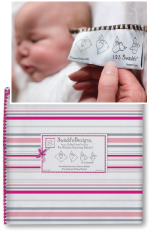The Benefits and Risks of Swaddling Your Baby
Get kid-friendly activities sent to you!
Get the Best Family Activities
All SwaddleDesigns Ultimate Receiving Blankets (pictured above in Very Berry Stripes, $25) are available in cotton flannel or a lighter marquisette weave and come with a three-step picture guide to swaddling.
Correct Swaddling Technique
Swaddling isn't rocket science, Dr. Karp says, but there are several different ways to swaddle a baby. He recommends using a simple blanket, at least 43 inches long, and following his four-step process. To learn this process ("It's a very specific technique that allows the blanket to be snugger and less likely to pop open," he explains), go to www.thehappiestbaby.org and click on "Find a Happiest Baby Class." These classes, offered throughout the NYC area and the country, are taught by trained experts in Dr. Karp's "5 S's" calming technique.
Some popular products make swaddling easier from the get-go, as well. The traditional square-shaped swaddle from Swaddle Designs is large enough to use effectively, the fabrics are all organic and breathable, and a mini-cheat sheet of graphic directions is sewn right onto the corner of the swaddle blanket. The Halo SleepSack product line, which is endorsed by IHDI, offers another "hip-healthy" way to swaddle and is one of the easiest to use -- foolproof in terms of allowing someone with no practice to put on a baby with ease, and always allowing your baby's hips and legs to move freely.
Discovering Potential Health Problems
Parents are usually alerted to possible problems with their children's hips during regular checkups. During visits, pediatricians look for swayback, which causes an extreme curve in the lower back, asymmetrical creases in the buttocks, hip clicks, pain, limited range of motion in the hip, limping, or leg length discrepancy. X-rays and other tests are needed to confirm diagnosis because some hip instability is common in about one out of every 20 full-term babies, while only two to three out of every 1,000 infants require treatment, according to the IHDI.
The younger the child is when diagnosed, the better his/her chances for complete recovery using the least invasive treatment possible, says Ernest Sink, M.D., board member of the IHDIP and co-director of the Center for Hip Pain and Preservation at the Hospital for Special Surgery on the Upper East Side. "An infant may be treated in a brace like the Pavlik harness, but an adolescent or young adult may require surgery...There are better non-surgical options for the younger child, when the hip shape still has the ability to remodel."
Treatment Options
The Pavlik harness positions a baby's hips so they are aligned in the joint and keep the hip joint secure. Even if there's only a problem with one hip, both hips will need to be positioned in the harness. Most children up to six months who are treated for hip dysplasia will wear this harness full-time for up to six to 12 weeks.
After babies have passed the six-month mark, they are more likely to be treated with traction, which stretches the ligaments around the hips, followed by a closed reduction surgery during which the doctor manipulates the hip joint to get the ball back into the socket. The most difficult part of this treatment can often be caring for the child, who will be placed in a spica cast after the surgery. The child will be in that cast for up to six months and need help with almost every aspect of his or her care. For toddlers striving for their independence, this can be tricky. Still, the condition must be treated.
"Developmental dysplasia of the hip is a common cause of hip osteoarthritis and pain in adolescents and young adults," Dr. Sink notes. "Recognition and treatment in infants and children may prevent or delay this. Parents must remember that through the treatments, children are comfortable. It's the parents who have the emotional burden of hearing the diagnosis, realizing that it needs treatment, and then acting on that."
To learn more, including answers to frequently asked questions, diagnosis advice, and a video demonstrating how to properly swaddle your baby, visit IHDI at www.hipdysplasia.org. You can also find swaddling guidance and local classes on Dr. Harvey Karp's "5 S's" calming techniques at www.thehappiestbaby.org.







